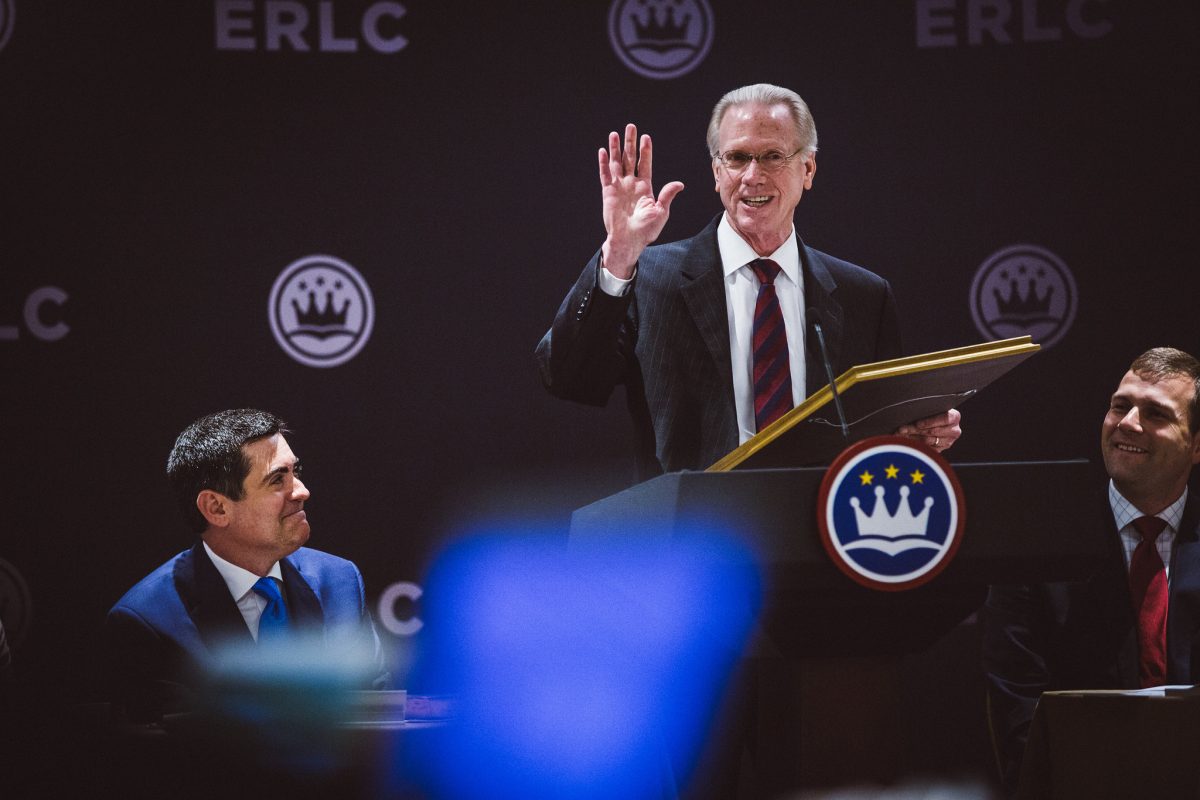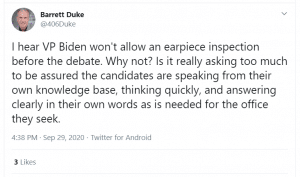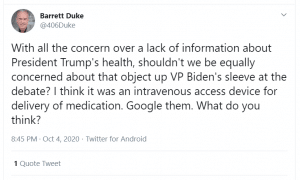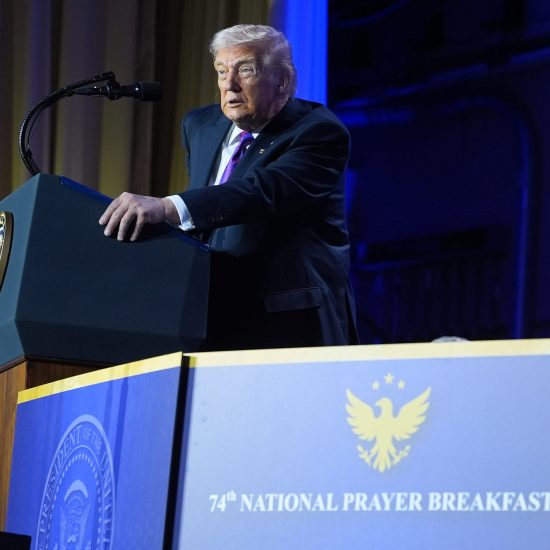
The executive director of the Montana Southern Baptist Convention took to Twitter this past week to push debunked conspiracy theories about the health and debate performance of Democratic presidential hopeful Joe Biden.
Barrett Duke, a former vice president at the Southern Baptist Convention’s Ethics & Religious Liberty Commission, tweeted a few hours before the Sept. 29 presidential debate between Biden and President Donald Trump that Biden may try to use an earpiece to get help during the debate.

“I hear VP Biden won’t allow an earpiece inspection before the debate,” Duke wrote. “Why not? Is it really asking too much to be assured the candidates are speaking from their own knowledge base, thinking quickly, and answering clearly in their own words as is needed for the office they seek.”
Duke didn’t note where he had heard this claim, but it was pushed on social media that day before the debate by rightwing accounts, including supporters of the pro-Trump conspiracy theory QAnon. Duke never tweeted a follow-up about if he thought Biden actually used an earpiece or not.

Barrett Duke receives the Richard Land Distinguished Service Award from the Ethics & Religious Liberty Commission on Aug. 25, 2016. (Baptist Press)
Similar debunked earpiece conspiracy theories have emerged in the past, including against Hillary Clinton in 2016, Barack Obama in 2008, and George W. Bush in 2004. In each case, advocates of the conspiracy theories seemed unwilling to accept that the candidate they opposed had performed so well during the debate without help.
After last week’s debate, the Trump campaign ran ads online claiming Biden had something in his ears — and several of the ads even featured a photo of Biden from the debate doctored to add a large wireless Apple headphone, as if no one would have noticed that during the live debate.
After this article was published, Duke told Word&Way Monday (Oct. 5) he felt the Trump campaign asking for an ear examination was “a legitimate request to be made,” though it was not in the previously-established rules for the debate. But Duke acknowledged that Trump ads with a doctored image to show Biden wearing an earpiece were false, noting that he watched it and there wasn’t a noticeable earpiece.
“That’s politics,” Duke said about the false Trump ads.
On Sunday (Oct. 4), with Trump in the hospital after contracting COVID-19, Duke returned to the topic of the debate to offer yet another debunked conspiracy theory, this time about Biden’s health.
 “With all the concern over a lack of information about President Trump’s health, shouldn’t we be equally concerned about that object up VP Biden’s sleeve at the debate?” Duke wrote. “I think it was an intravenous access device for delivery of medication. Google them. What do you think?”
“With all the concern over a lack of information about President Trump’s health, shouldn’t we be equally concerned about that object up VP Biden’s sleeve at the debate?” Duke wrote. “I think it was an intravenous access device for delivery of medication. Google them. What do you think?”
Googling the topic, however, quickly brings up news reports debunking the claims that Biden either had a wire or an IV in his sleeve. Rather, the object seen on his wrist appears to be the rosary that his son Beau was wearing when he passed away from brain cancer in 2015. The elder Biden has worn that rosary, a Catholic beaded prayer guide, ever since.
After this article was published, Duke deleted the tweet about an IV.
“It looked strange to me,” he said to Word&Way about the item on Biden’s left wrist. “I genuinely put it out there to see if anybody thought so.”
“It didn’t look like rosary beads to me. But nobody else has responded with anything other than that it’s rosary beads,” Duke added. “So, I’m just figuring I got it wrong. I deleted the tweet. I’m not interested in putting stuff out there that’s inaccurate or not helpful.”
Duke said he tries “as hard as I can to check things out” and he deleted the tweet since “I’m not interested in disinformation.”
Ed Stetzer, a prominent Southern Baptist writer who is dean and professor at Wheaton College and leads the Wheaton College Billy Graham Center, recently urged Christians to avoid espousing conspiracy theories like those from QAnon.
“If there is anything that represents the scandal of the evangelical mind right now, it’s the gullibility of Christians who need to be discipled into critical thinking about how to engage the world around them. We need to be able to see through the bias and discern conspiracy theories that have risen to the level of messianic religion,” Stetzer wrote in September in USA Today. “As seekers of truth, we need pastors, leaders, and everyday Christians to address this conspiracy, and others like it, before others are fooled. It’s the Christian’s role to speak up about this and against this, even when the president does not, and before more people get hurt.”
Duke started as the executive director of the Montana convention in January 2017. Before that, he served the ERLC as vice president of the Washington, D.C., office for public policy and research. In 2017, he chaired the SBC’s Resolutions Committee that initially refused to put forward a resolution condemning alt-right White Supremacists. Duke has not tweeted about Trump’s refusal during the debate to condemn White Supremacist groups.
This article was updated with comments from Duke, who had not responded to Word&Way’s request for comment until after publication.






